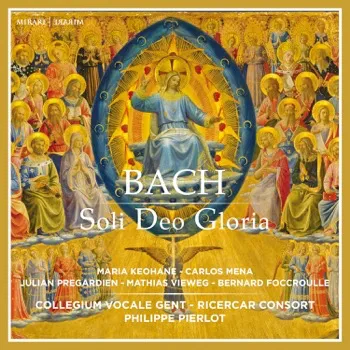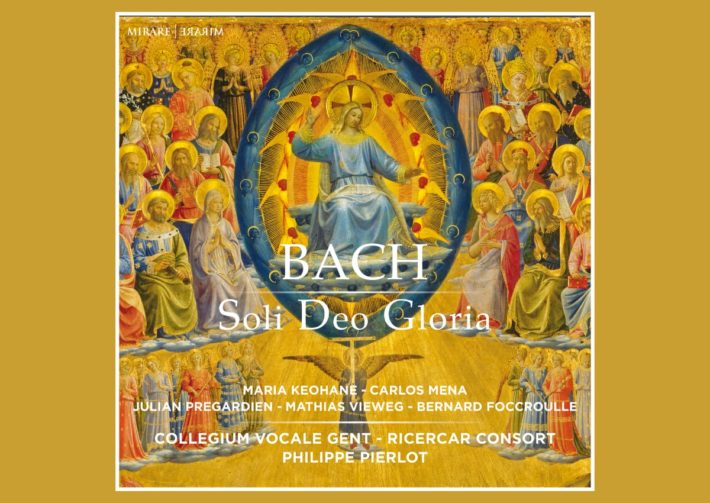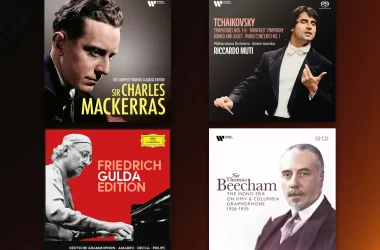Bach wrote the first version of “Ich hatte Bekümmernis” (BWV 21) in Weimar, most likely in 1713. A year later he added two movements, presenting the work as part of a job application in Hamburg (the version heard here). Additional revisions were made for performances in Cöthen (1720) and Leipzig (1723). It is an exceptionally compelling music, a quality highlighted by the excellence of this new performance.

The opening Sinfonia, with its exquisite writing for solo oboe and violin, establishes a palpable mood of resigned sadness, which carries right into the first chorus, “I have a troubled heart.” A compositional device typical of Buxtehude appears at 2’44”: the music pauses on the word “aber” (but), then suddenly shifts into a quicker tempo with continually overlapping polyphony, conveying the “consolation that restores the soul.” Choir and orchestra make this passage truly dance, which then makes the return of the opening music even more unsettling.
Suffering is the dominate tone of the following three movements. Soprano Maria Keohane’s clear tone, light vibrato and exemplary diction make the sorrowful yearning of her aria deeply touching (track 3). Tenor Julian Prégardien captures every textual subtlety in the recitative and aria “Bäche von gesalznen Zähren” (tracks 5-6) that follow. A particularly wonderful moment occurs at 1’58” (6), where he thrillingly evokes “storms and waves” assailing the protagonist’s soul. And the Collegium Vocale Ghent prove equally skilled in “Was betrübst du dich,” using different sonorities and articulation to convincingly convey the contrasts between the soul being weighed down by guilt and trusting God to make that burden lighter.
The cantata’s second part, typically performed during communion, brings a very different atmosphere, stressing that trust in God brings consolation and comfort. Keohane and bass Matthias Vieweg’s duet between the soul and Christ has a sensuality that borders on the secular and listen to how Bach’s change from duple to triple meter at 2’23” (track 9) heightens their promises to love one another. The final chorus (which sets the same text as the final chorus of Handel’s Messiah) is thrilling, capping off a wonderfully dramatic and expressive performance.
“Die Himmel erzählen die Ehre Gottes” (BWV 76) was first performed on June 6, 1723. This was Bach’s second week at his new position in Leipzig, and he was clearly intent on impressing his new congregation. In two parts, each with seven movements, the music reflects on the Gospel reading of the day, the parable of the great banquet. A king invites his citizens to his son’s marriage feast, but the invited guests ignore the invitation. The king then asks his servants to go out into the streets and invite any who will accept the invitation – those people become the banquet’s honored guests.
The opening chorus is resplendent, its energy infectious. Collegium Vocale Ghent sings with emotional fervor, making light of Bach’s polyphonic complexities. Pierlot’s decision to assign some of the choral writing to soloists adds another layer of timbrel variety. Singing throughout the Cantata is consistently excellent, in part because every singer reveals an acute awareness of what the text says and means. But throughout this performance I was particularly impressed by the instrumental playing.
The trumpet (sadly the booklet doesn’t clearly credit who plays in this cantata), features in movements 1, 5 and 7 is played with clear and vibrant tone, always well balanced within the overall texture. In “Hört, ihr Völker, Gottes Stimme” (16) the violin creates a feeling of relaxed dialogue between itself and the soprano, phrasing with a lilting delicacy that invites the listener to ‘hurry to the mercy throne.” The second half of the cantata becomes more intimate, focusing on brotherly devotion, bringing new instrumental coloring from the oboe d’amore (Emmanuel Laporte) and viola da gamba (Philippe Pierlot). Sample their playing in “Liebt, ihr Christen, in der Tat” (26), as they join tenor Carlos Mena in imploring all followers of Christ to “Love…through your deeds.” This is a profoundly tender and deeply affecting reading.
Organist Bernard Foccroulle’s performances of four solo-organ preludes are placed between each section of the two cantatas. He chooses clear registrations, plays with precise articulation, and finally opens up the organ in the final piece to make an especially rousing end to this inspiring program. Of course, there are several competing versions of each cantata, but these new performances take their place with the readings by Gardiner, Suzuki and Herreweghe. If you sometimes find Gardiner overly dramatic and hard-driven, or find Suzuki and Herreweghe too introverted and gentle, Pierlot’s readings may seem like an ideal middle ground.
“Soli Deo Gloria“
Bach – Cantatas BWV 21, 76
4 Preludes for solo organ
Maria Keohane – Soprano
Carlos Mena – Alto
Julian Prégardien – Tenor
Matthias Vieweg – Basse
Bernard Foccroulle – Organ
Collegium Vocale Gent
Ricercar Consort
Philippe Pierlot – Conductor, Viola da Gamba
Mirare, CD MIR490



















